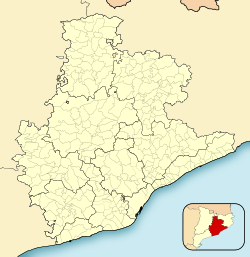Hospital de Bellvitge | |||||||||||
|---|---|---|---|---|---|---|---|---|---|---|---|
 | |||||||||||
| General information | |||||||||||
| Location | L'Hospitalet de Llobregat | ||||||||||
| Coordinates | 41°20′36″N2°6′19″E / 41.34333°N 2.10528°E | ||||||||||
| System | Barcelona Metro rapid transit station | ||||||||||
| Owned by | Transports Metropolitans de Barcelona | ||||||||||
| Construction | |||||||||||
| Structure type | Underground | ||||||||||
| Other information | |||||||||||
| Fare zone | 1 (ATM) | ||||||||||
| History | |||||||||||
| Opened | 1989 | ||||||||||
| Services | |||||||||||
| |||||||||||
| Projected | |||||||||||
| |||||||||||
| |||||||||||
Hospital de Bellvitge, formerly known as Feixa Llarga, is a Barcelona Metro station, in the L'Hospitalet de Llobregat municipality of the Barcelona metropolitan area, and named after the nearby Bellvitge University Hospital. The station is the western terminus of line L1. [1] [2]
Contents
The station lies under the car park of the hospital, between the hospital itself and the Gran Via de les Corts Catalanes . It has a single entrance and underground ticket hall, which gives access to two 96-metre (315 ft) long side platforms on a lower level. Beyond the platforms at the country end of the station are several storage and reversing sidings. [1] [2]
The station opened in 1989, when line L1 was extended from Avinguda Carrilet station. It was originally known as Feixa Llarga, after the Estadi La Feixa Llarga, the football stadium of local team CE L'Hospitalet. It was given its current name in 2003. [1] [2]
Future plans are for L1 to be extended from this station towards El Prat de Llobregat, where it will provide interchange with the planned joint section of lines L2 and L9 towards Barcelona Airport. [1]


